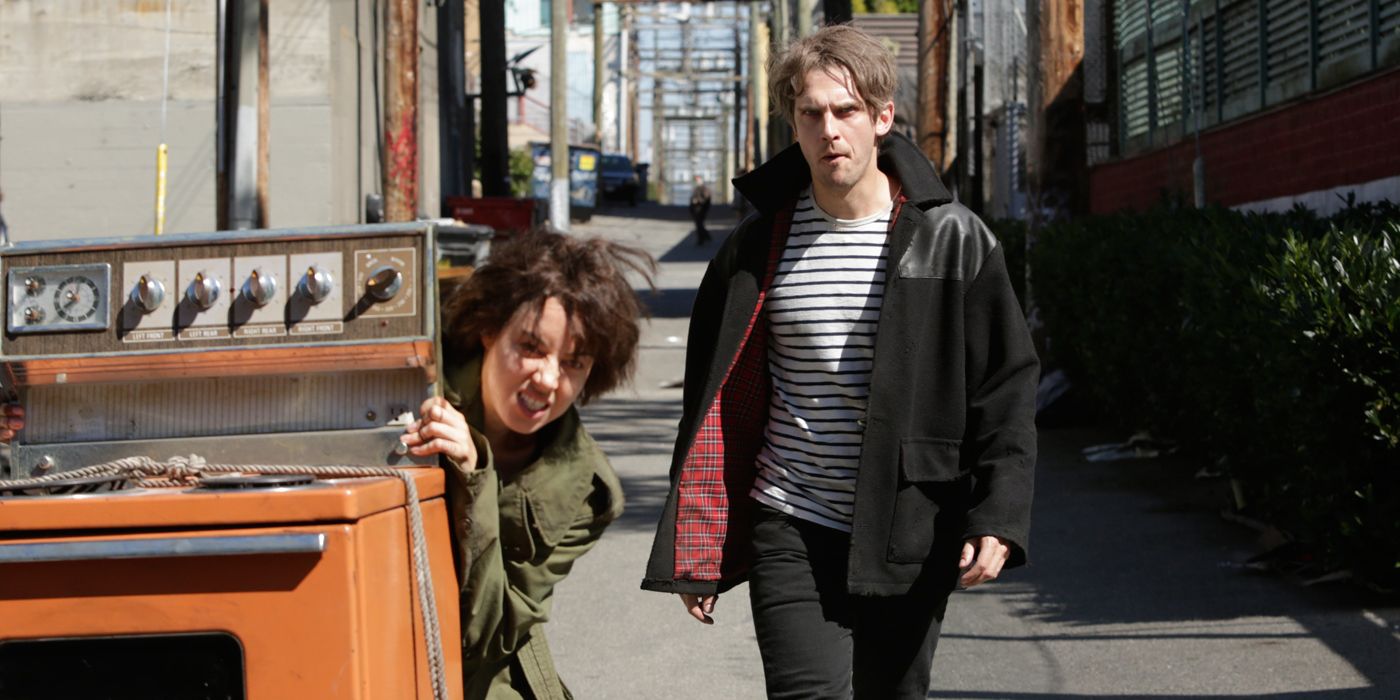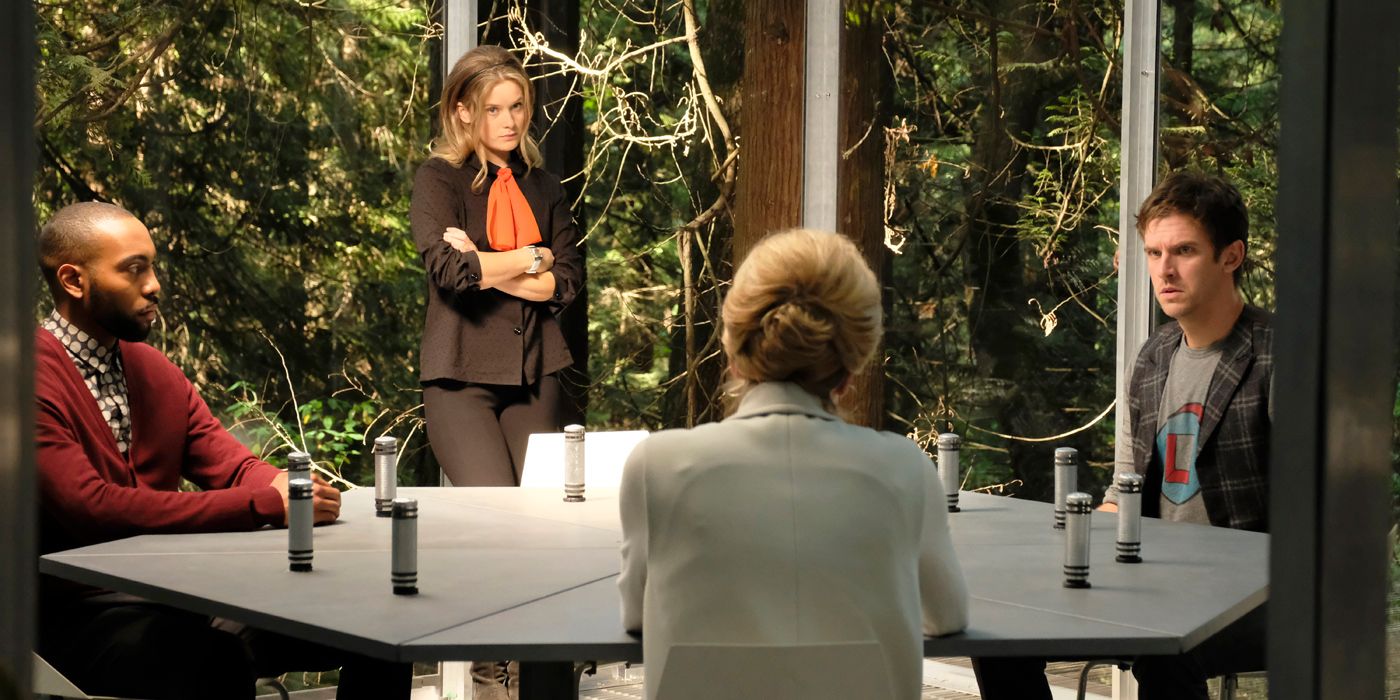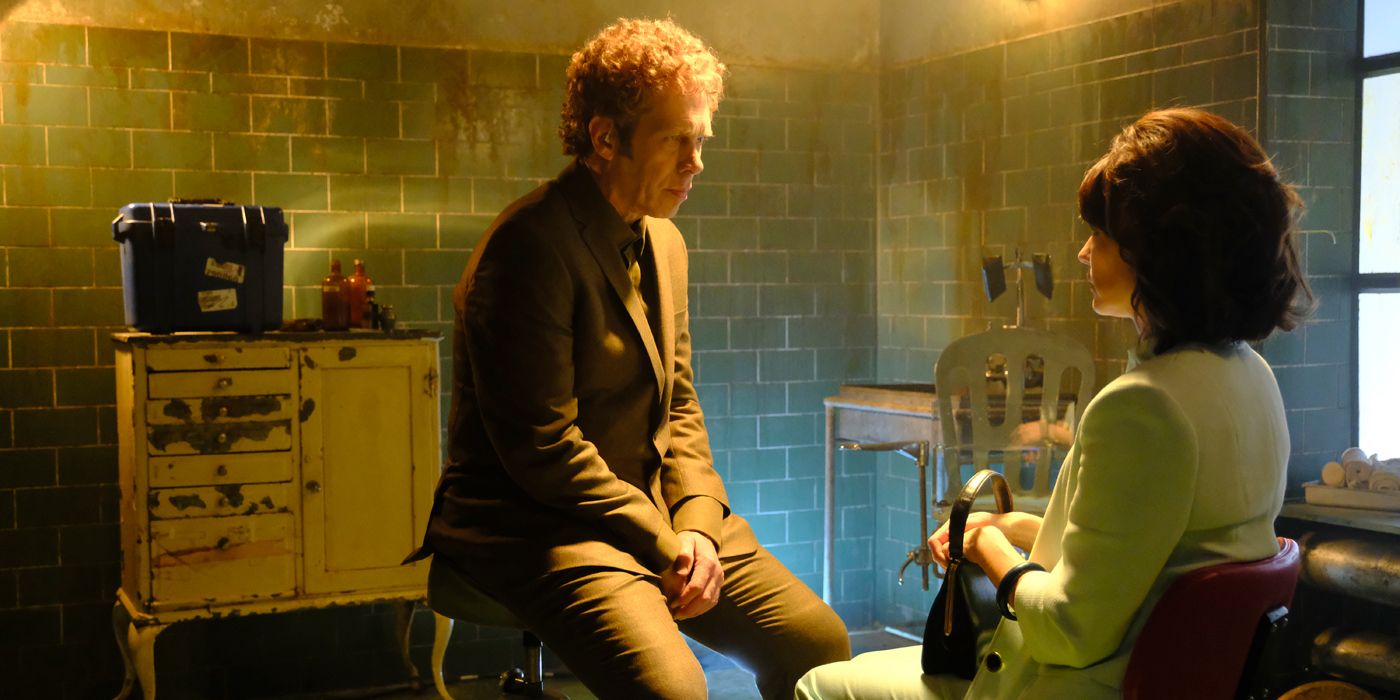"And all the while, wolves were at our heels ..."
-- David Haller
After the often-frenetic pace of last week's premiere, with its flashbacks, dream sequences and literal fireworks, "Legion" slows down in its second episode, if only just a little. The gunfire, explosions and mayhem of David Haller's rescue from Division 3's facility are juxtaposed with bucolic images of his lazy journey, by motorboat no less, to Summerland, which promises safety -- for now, at least -- and, even better, answers.
It's not exactly Xavier's School for Gifted Youngsters. Nestled in the forest, it's New Age retreat meets Cameron Frye's house from "Ferris Bueller's Day Off," a Mid-Century modern haven where its occupants explore memories while sitting in cube of glass and metal among the trees, and a quirky scientist conducts tests using delightfully anachronistic technology. Yet not far off, the soldiers of Division 3, led by the Eye, move ever closer.
RELATED: Arriving Late to "Legion"? Here's What to Look For
That they conduct their pursuit on foot, with vicious dogs barking as they strain their leashes, adds to the urgency, and the threat, of their actions. They're not merely looking for David and Syd; they're hunting them. What happens if, or when, Division 3 finds them is made clear by Jean Smart's Melanie Bird, the Professor X to this group of misfits.
"The divisions were created by the government to track people like you and Syd," she says, providing as much explanation as we need for the organization. "And the people they can't control, they kill."
However, her more immediate concern is David (Dan Stevens), whom Ptonomy Wallace (Jeremie Harris) says Melanie believes is "the key" to "winning the war, and other things," which suggests much larger stakes while perhaps also hinting at a messianic aspect to their struggle. The group's "memory artist," who can remember every moment of his own life -- back to the womb -- and unlock the memories of others, Ptonomy guides Melanie and David back to the latter's childhood, to when he first began experiencing visions. It's a seemingly idyllic time spent with his sister and parents in the country, where light pollution wouldn't interfere with his father's work as an astronomer. (What, you were expecting Charles Xavier?)
RELATED: X-Men Revolution: How Fox's Franchise Has Entered a Bold New Era
Yet it wasn't merely contented gardening and afternoons spent running in fields; there's something sinister lurking along the edges of David's memories. While he can clearly recall his mother, sister and dog, the face of David's father is obscured by shadow. And a perfectly pleasant scene in which his father reads him a bedtime story quickly deteriorates as "The World's Angriest Boy in the World" grows more unsettling with each turn of the page. There's little doubt that David is the angry boy of the book.
Perhaps just as disquieting for Ptonomy and Melanie is that David's mind is so powerful it resists guidance, jumping unbidden to some memories while purposely obscuring details of others; a glitch, Ptonomy calls it. Those moments are revealing, however, introducing David's therapist Dr. Poole, whom we know from the premiere episode meets some kind of ill fate, and dropping more hints about David's girlfriend, whom he's not eager to talk about in the past or the present. We do know now that the incident in the kitchen of their apartment occurred about six years ago, even if we're no closer to learning what happened to her (it's probably safe to say it wasn't good, though).
More interesting still is the flashback to David's memory of Lenny before they were patients at Clockworks Psychiatric Hospital. While it's certainly conceivable that two friends were committed to the same facility at about the same time, these scenes would seem to lend credence to the working theory that Lenny is merely an aspect of David's fragmented psyche. In this memory, Lenny is waiting near Dr. Poole's office (clad in a shirt with a red star, you'll note) with a stolen kitchen range she intends to trade for drugs. She handles the negotiations while David remains disconnected from the proceedings, distracted by a barking dog while hearing the voices of Lenny and the dealer as if they were broadcast over a radio. As they get high in the apartment, David momentarily sees Lenny as the Demon With Yellow Eyes, and his reaction doesn't escape the notice of Melanie and Ptonomy. Questioned about what happened, David flatly responds, "Nothing."
RELATED: "Stranger Things" is More of An X-Men Show Than "Legion"
"We were high, OK?" he says when pressed. "I see things, OK? It's not real. It's my brain." Melanie doesn't buy it, however, saying, "The things you see are real," which adds another, potentially horrifying, wrinkle to the identity of the demon.
But as revelatory and disconcerting as "Legion's" second episode is at times, it also has its tender and lighthearted moments. The relationship between Syd (Rachel Keller) and David advances even as we learn more about the sequence of events that brought them to Summerland. Although it appeared in the premiere that Syd may have been sent to Clockworks for David, she was only brought to Melanie's attention by the massive release of power following their body switch. Unfortunately, that's also what tipped off Division 3. It's important exposition delivered in fumbling, and touching, exchanges in which David accidentally reads Syd's mind, picking up on her silent pledge to protect him -- "You are cute, though," she thinks -- and David appears to come to terms with the physical barriers to their relationship by concluding, "We're having a romance of the mind."
And then there's Bill Irwin as Cary Loudermilk, the idiosyncratic scientist at Summerland who tries to use an MRI to help unlock David's memories. His references to Kerry (Amber Midthunder) lead to a humorous Abbott and Costello-like exchange with David as the latter is stuck within the scanner, unable to move or "sneeze." Whether it's Cary's technique or simply his isolation within the machine, David is able to "see" his sister (Katie Aselton) paying a visit to Clockworks, where she's pointedly informed the hospital has no record of David Haller or Dr. Kissinger, even as staff members work to repair the walls near her. Undeterred by denials or questions about her own mental health, Amy Haller turns to leave, only to be confronted by the Eye and his men.
That could have been David's "Empire Strikes Back" moment, spurring him to leave Summerland to rescue his sister. Instead, his fear -- no doubt coupled with the anxiety from being trapped within the scanner -- leads first to another appearance by the Demon With Yellow Eyes, and then to another demonstration of his awesome powers: Unable to extricate himself from the MRI, a desperate David teleports it outside, to the amazement of Melanie and the others.
That's not to say David doesn't want to flee Dagobah Summerland to save Amy; it's just that Syd is more convincing than Yoda, saying that his sister won't be killed by Division 3, because she's bait, something that apparently hadn't occurred to him. "Stay. Do the work," Syd says. "Not long, just enough to learn what you can do -- what we can do, together. Then we can rescue her like we rescued you. Do the work."
Note that Syd didn't say anything about Division 3 not hurting Amy. The Eye, with his container of ... leeches, maybe?, clearly intends to make her stay uncomfortable.
Odd and Ends
- The color associations continue, with Syd wearing an orange scarf and headband, while Amy's dress shifts from a vivid green to pale mint.
- As Ptonomy chats with a recovering David by the stuffed mountain goat, the voice over the intercom offers a reminder that one area of Summerland is a levitation-free zone, before announcing the cancellation of an advanced time-travel class.
- Given the growling animal in the cage, and the Eye's whittled figurine, in the first episode, it's likely no coincidence that David's opening narration mentions, "the wolves were at our heels." That's underscored later as he recalls the constellations from his childhood, emphasizing Lupus, the wolf.
- Do we look for any significance in the use of "Road to Nowhere" in the opening moments?




